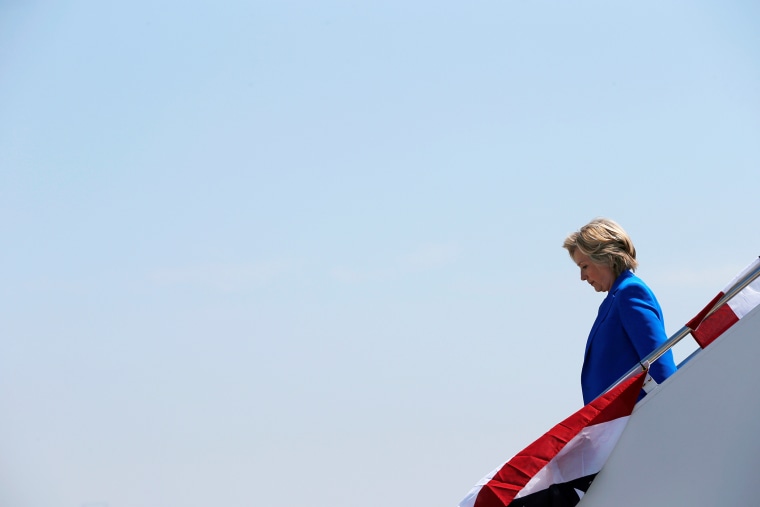Under normal circumstances, a presidential candidate contracting a fairly common, easily treated infection wouldn't be front-page news. But nothing about the 2016 presidential campaign is normal.
Hillary Clinton attended a Sept. 11 memorial service in New York yesterday morning, and after over an hour in the heat, Clinton appeared unsteady as she was helped into an SUV. Soon after, as NBC News reported, we learned why.
Hillary Clinton's wobbly incident Sunday is a near-textbook case of what can happen with "walking pneumonia" -- patients don't feel great, but they're not sick enough to stay home in bed or to be hospitalized. [...] It turns out it was pneumonia and dehydration, said Dr. Lisa Bardack, who examined her at her home in Chappaqua.
"Secretary Clinton has been experiencing a cough related to allergies. On Friday, during follow up evaluation of her prolonged cough, she was diagnosed with pneumonia," Bardack said in a statement. "She was put on antibiotics, and advised to rest and modify her schedule. While at this morning's event, she became overheated and dehydrated. I have just examined her and she is now re-hydrated and recovering nicely."
Given what we know, there's every reason to believe Clinton will be fine and voters will see her back on the campaign trail in a few days. As routine ailments go, it's difficult to see this as especially serious.
In fact, since finding out about her "walking pneumonia" on Friday, Clinton apparently did a fair amount of work. That's not too surprising: the NBC report added that people with this infection "often feel well enough to go about their business, especially once they start taking antibiotics."
Reuters' report quoted Peter Daou, a former Clinton aide, saying, "After being diagnosed with pneumonia, Hillary Clinton ran a two-hour national security meeting, gave a press conference, and spent an hour and a half in the heat at a September 11 event. It was an impressive feat of physical strength that undermined weeks of health conspiracies."
And yet, it's because of those conspiracy theories that so much of the political world is focused on this story.
CNN's media correspondent, Brian Stelter, wrote overnight that coverage of this story "will be magnified and extended because the people who've been pushing conspiracy theories about Clinton's health for some time understand well one of the less appealing qualities of the political press: say something long enough and loud enough and it becomes a controversy, part of the narrative, and gets covered regardless of its actual importance or basis in fact."
That's not a flattering assessment. Donald Trump and his allies peddled outrageous conspiracy theories about Clinton's health, including baseless allegations about the candidate having some kind of neurological disorder. The evidence supporting those claims does not exist, which has done little to dissuade the right.
And since Republicans have been so aggressive in pushing health conspiracy theories, that means there's now a "narrative" to contend with. And because Clinton is on antibiotics, her temporary ailment is feeding the narrative, which turns a routine campaign development into a major, race-changing campaign development.
Put it this way: if Trump were diagnosed with walking pneumonia, or if Barack Obama or Mitt Romney had the same infection at this point four years ago, it would have been noticed, but it wouldn't receive saturation coverage -- because none of them have been the targets of health conspiracy theories.
Perhaps the moral of the story is one of campaign incentives: when going after a campaign rival, make up all kinds of stuff, without regard for accuracy. Maybe you'll get lucky and something will happen that kinda sorta relates to one of the "narratives" you created.
